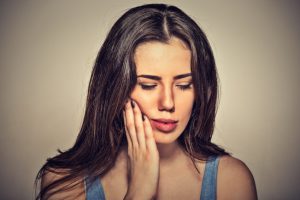
Headaches, facial pain, jaw dysfunction and dental damage–these symptoms sound like the results of an auto accident. However, they often signify a common dental disorder called tooth grinding, or bruxism. Dr. Christina Papageorgiou and her associate dentist, Dr. Medha Singh, diagnose bruxism in their Natick, MA office and offer workable remedies to optimize patient comfort and minimize damage.
What causes bruxism?
Bruxism originates as regular clenching and grinding of adult and children’s teeth. Often nocturnal, bruxism happens during the day, too, unconsciously as a stress-related habit. Regularly, however, this concerning oral health disorder is noticed only by other people in the same room as the patient, especially spouses. While people of all ages and walks of life suffer from bruxism, young women seem most prone.
Fortunately, most children outgrow bruxism by their teen years. Teeth clenching seems a normal part of some children’s oral development. Just as with adult bruxism, however, teeth grinding requires treatment from your Natick, MA dentist if symptoms become severe or tooth enamel or restorations deteriorate. Chipped fillings, loosened teeth, and gum damage many times accompany bruxism. These cannot be left unattended.
Evaluation for and treatment of bruxism
If you are clenching your teeth or notice that a child or other loved one grinds theirs, don’t delay in seeking treatment from Papageorgiou Dental Associates. Dr. Papageorgiou and her colleagues meticulously examine the oral cavity for signs of:
- Dental damage, such as uneven tooth enamel
- Gum damage
- Excessive wear on crowns and other restorations
- Loose teeth
- Jaw joint dysfunction (difficulty opening or closing the mouth)
- Migraines and morning headaches
- Damaged cheek tissue from unconscious chewing
- Memory and concentration problems
- Daytime irritability
Digital x-rays uncover abnormalities, too.
Treatment may be as simple as ice, heat and rest, plus employing stress reduction strategies such as relaxation exercises. Anti-depressants and muscle relaxants are frequent pharmaceutical fixes, too.
BOTOX (botulinum toxin) injections are gaining favor as this medication stops jaw and facial muscles from tightening. Some doctors and dentists advise limiting the consumption of alcohol and caffeine.
Mechanical interventions include orthodontics, such as Invisalign clear aligners, to address misaligned bites. Dental crowns and fixed bridgework level how teeth come together.
Custom-made acrylic mouthguards cushion bites at night. Covering the top and bottom arches, these guards work best when combined with other treatments. Dr. Papageorgiou takes oral impressions to accurately design these devices.
Seek help for bruxism
Don’t suffer with your teeth clenching issues, and don’t cause yourself substantial oral damage. Call Papageorgiou Dental Associates for a consultation on bruxism. Carefully note your symptoms, health history and current medications so the dentist gets the clearest possible picture of your oral and systemic health. Contact the Natick, MA office today.

